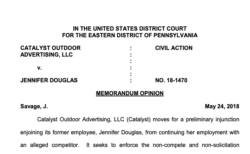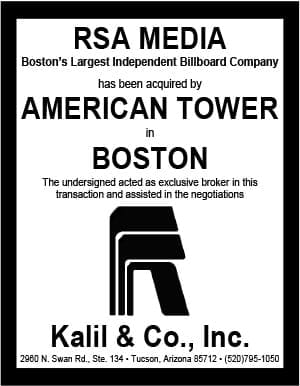 Out of home companies sometimes require employees to sign a non-compete agreement in which they agree not to go to work for a competitor for a period of time after they leave. Don’t make the terms of your non-compete too broad or it may be unenforceable. That’s the lesson of Douglas v Catalyst Outdoor. Here are the facts
Out of home companies sometimes require employees to sign a non-compete agreement in which they agree not to go to work for a competitor for a period of time after they leave. Don’t make the terms of your non-compete too broad or it may be unenforceable. That’s the lesson of Douglas v Catalyst Outdoor. Here are the facts
- Catalyst Outdoor, an out of home advertising company with a plant in Pennsylvania and New Jersey, hired Jennifer Douglas as a sales rep in February 2016. Douglas signed an employment agreement with a two year non-compete and non-solicitation clause.
- The non-compete clause prohibited Douglas from working for any company in the out of home advertising business except Lamar, Clear Channel Outdoor or OUTFRONT for a period of two years following her termination.
- Douglas was terminated in 2017. One month later she began working for City Outdoor a New York headquartered out of home company with no billboards in Pennsylvania or New Jersey.
- Catalyst moved for a preliminary injunction to prevent Douglas from continuing in her employment with City Outdoor because it was a competitor.
- In May 2018, a Pennsylvania District court ruled against Catalyst. The court found that a two-year non-compete term was reasonable. “A two year restriction for restrictive covenants is generally upheld in Pennsylvania Courts.” The court took issue with the lack of a geographic limitation to the non-compete: “The agreement has no geographic limitation. As it is now written it covers the entire world. Having failed to define the geographic borders of the non-compete territory, Catalyst cannot now unilaterally impose a territorial limit.”
- The Court went on to rule that non-compete was not enforceable because City Outdoor was not a competitor: “City Outdoor operates exclusively in New York City. Catalyst, on the other hand, operates billboards in Southeastern Pennsylvania and one in New Jersey. It has limited plans to develop in New York and no plans to develop in New York City. Because we find the two companies do not compete in the same market we shall not enjoin Douglas from working for city Outdoor in New York.”
Insider’s take: To be enforceable a non-compete needs to a reasonable term and a reasonable limit. Out of home attorney Richard Rothfelder says that a typical non-compete has a 6 month to 2 year time limit and a geographic radius of 50 miles to throughout a state. See Rothfelder’s Covenants Not to Compete and Out of Home for more details.
[wpforms id=”9787″]
Paid Advertisement


















How about the former employer pays for her bills for the two years?
In California, non-compete agreements are enforceable only in connection with the sale of the non-competing person’s complete interest in the business. Employees cannot be prevented from competing, but can be prevented from using trade secrets and proprietary information.
In California, non-compete agreements are enforceable only against someone who is selling his/her complete interest in the business. Employees may compete (but may not use trade secrets or other proprietary information).